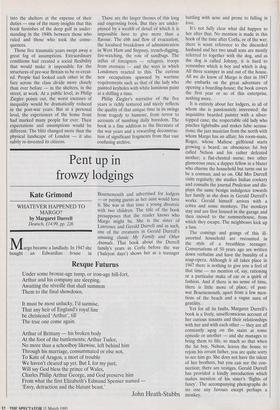Pent up in frowzy lodgings
Kate Grimond
WHATEVER HAPPENED TO MARGO? by Margaret Durrell Deutsch, £14.99, pp. 226 Margo became a landlady. In 1947 she bought an Edwardian house in Bournemouth and advertised for lodgers — or paying guests as her aunt would have it. She was at that time a young divorcée with two children. The title of the book presupposes that the reader knows who Margo might be. She is the sister of Lawrence and Gerald Durrell and as such, one of the creatures in Gerald Durrell's amusing classic My Family and Other Animals. That book about the Durrell family's years in Corfu before the war ('halcyon days') shows her as a teenager
Rexque Futurus
Under some bronze-age tump, or iron-age hill-fort, Arthur and his company are sleeping, Awaiting the reveille that shall summon Them to the final showdown.
It must be most unlucky, I'd surmise, That any heir of England's royal line be christened 'Arthur', till The true one come again.
Arthur of Brittany — his broken body At the foot of the battlements; Arthur Tudor, No more than a schoolboy likewise, left behind him Through his marriage, consummated or else not, To Kate of Aragon, a mort of trouble We haven't cleared up yet. But I, for my part, Will say God bless the prince of Wales, Charles Philip Arthur George, and God preserve him From what the first Elizabeth's Edmund Spenser named - 'Envy, detraction and the blatant beast.'
John Heath-Stubbs
battling with acne and prone to falling in love.
It's not fully clear what did happen to her after that. No mention is made in this book of the time after Corfu, or of the war; there is scant reference to the discarded husband and her two small sons are mostly referred to together with the dog, and as the dog is called Johnny, it is hard to remember which is boy and which is dog. All three scamper in and out of the house. All we do know of Margo is that in 1947 she embarks on the great adventure of opening a boarding-house; the book covers the first year or so of this enterprise, nothing more.
It is entirely about her lodgers, in all of whom she is passionately interested: the inquisitive bearded painter with a silver- topped cane; the respectable old lady who pinches lightbulbs and makes false accusa- tions; the jazz musician from the north with whom Margo has an affair; his room-mate, Roger, whose Maltese girlfriend starts growing a beard; an obnoxious fat boy called Nelson and his rather defeated mother; a flat-chested nurse; two other glamorous ones; a dapper fellow in a blazer who charms the household but turns out to be a conman; and so on. Old Mrs Durrell visits regularly; she studies Indian cookery and consults the journal Prediction and dis- plays the same benign indulgence towards her family as she does in Gerald Durrell's works. Gerald himself arrives with a cobra and some monkeys. The monkeys stay and are first housed in the garage and then moved to the summerhouse, from which they escape. The neighbours kick up a fuss.
The comings and goings of this ill- assorted household are recounted in the style of a breathless teenager. Conversations of 50 years ago are written down verbatim and have the banality of a soap-opera. Although it all takes place in 1947 there is nothing to give you a feel of that time — no mention of, say, rationing or a particular make of car or a quirk of fashion. And if there is no sense of time, there is little more of place, of post- war Bournemouth, apart from a few men- tions of the beach and a vague aura of gentility.
Yet for all its faults, Margaret Durrell's book is a lively, unselfconscious account of her curious tenants and their relationships with her and with each other — they are all constantly agog on the stairs at some episode or another — and she manages to bring them to life, so much so that when the fat boy, Nelson, leaves the house to rejoin his errant father, you are quite sorry to see him go. She does not have the talent of her brothers, but you can see the con- nection; there are vestiges. Gerald Durrell has provided a kindly introduction which makes mention of his sister's 'flights of fancy'. The accompanying photographs do no one any favours except perhaps a monkey.


























































 Previous page
Previous page